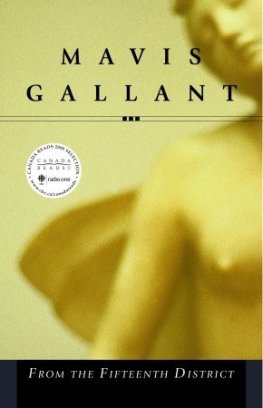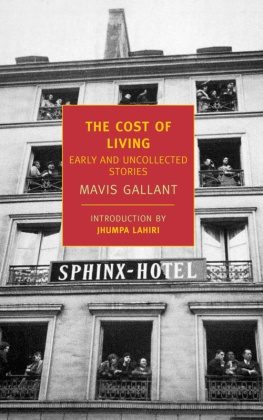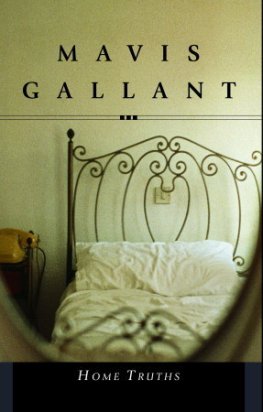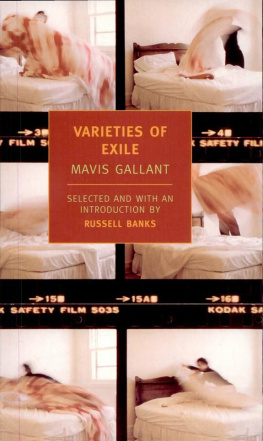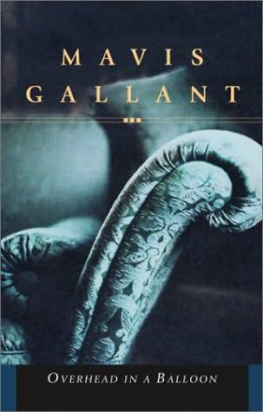Mavis Gallant
The Pegnitz Junction

A Novella
She was a bony slow-moving girl from a small bombed baroque German city, where all that was worthwhile keeping had been rebuilt and which now looked as pink and golden as a pretty child and as new as morning. By the standards of a few years ago she would have been thought plain; she was so tall that she bumped her head getting in and out of airplanes, and in her childhood she had often been told that her feet were like canal boats. Her light hair would have been brown, about the colour of brown sugar, if she had not rinsed it in camomile and whenever possible dried it in sunlight; she could not use a commercial bleach because of some vague promise she had given her late grandmother when she was fourteen.
She had a striking density of expression in photographs, though she seemed unchanging and passive in life, and had caught sight of her own face looking totally empty-minded when, in fact, her thoughts and feelings were pushing her in some wild direction. She had heard a man say of her that you could leave her in a caf for two hours and come back to find she was still smoking the same cigarette. She had done some modelling, not well paid, in middling ready-to-wear centers such as Berlin and Zurich, but now she was trying to be less conscious of her body. She was at one of those turnings in a young life where no one can lead, no one can help, but where someone for the sake of love might follow.
She lived with her family and was engaged to marry a student of theology, but the person closest to her was Herbert, who was thirty-one, divorced, and who with the help of a housekeeper was bringing up his only child. Unlike the student of theology, he had not put up barriers such as too much talk, self-analysis, or second thoughts. In fact, he tended to limit the number of subjects he would discuss. He had no hold on her mind, and no interest in gaining one. The mind that he constantly took stock of was his childs; apparently he could not be captivated in the same way by two people at once. He often said he thought he could not live without her, but a few minutes after making such a declaration he seemed unable to remember what he had just said, or to imagine how his voice must have sounded to her.
After they had known each other about seven months, they came to Paris for a holiday, all three of them she, Herbert, and the child, who was called little Bert. Christine had just turned twenty-one and considered this voyage a major part of her emancipation. It was during the peak of a heat wave the warmest July on record since 1873. They remained for a week, in an old hotel that had not been repainted for years because it was marked for demolition. They had two dusty, velvety rooms with a bathroom between. The bathroom was as large as the bedrooms together and had three doors, one of which gave on the passage. Leaving the passage door unlocked soon turned out to be a trick of little Berts an innocent trick; the locks were unlike those he was used to at home and he could not stop fiddling with them. The view from every window was of a church covered with scaffolding from top to bottom, the statue of a cardinal lying on its side, and a chestnut tree sawed in pieces. During the week of their stay nothing moved or was changed until a sign went up saying that a new car park was to be built under the church and that after its completion the chestnut tree would be replaced by something more suited to the gassy air of cities. The heat at night made sheets, blankets, curtains, blinds, or nightclothes unthinkable: she would lie awake for a long time, with a lock of her hair across her eyes to screen out the glare of a street lamp. Sometimes she woke up to find herself being inspected from head to foot by little Bert, who had crept to their room in search of his father. It was his habit to waken at two, and on finding the bed next to his empty, to come padding along in bare feet by way of the bathroom. Through her hair she would watch him taking a long look at her before he moved round the bed and began whimpering to Herbert that he was all alone and afraid of the dark.
Herbert would turn at once to little Bert. His deepest feelings were linked to the child. He sometimes could reveal anguish, of which only the child was the source. His first move was always to draw the sheet over Christine, to protect little Bert from the shock of female nakedness. Without a breath of reproach he would collect his dressing gown, glasses, watch, cigarettes, and lighter and take little Bert by the hand.
Im sorry, quavered the child.
Its all right.
Then she would hear the two of them in the bathroom, where little Bert made the longest possible incident out of drinking a glass of water. The next day Herbert could not always recall how he had got from one bed to the other, and once, during the water-drinking rite, he had sleepily stuck a toothbrush in his mouth and tried to light it.
On their last night in Paris (which little Bert was to interrupt, as he had all the others) Herbert said he would never forget the view from the window or the shabby splendour of the room. Both rooms, he corrected; he would not leave out little Bert. That day the Paris airports had gone on strike, which meant they had to leave by train quite early in the morning. Christine woke up alone at five. The others were awake too she could hear little Berts high-pitched chattering but the bathroom was still empty. She waited a polite minute or so and then began to run her bath. Presently, above the sound of rushing water, she became aware that someone was pounding on the passage door and shouting. She called out, What? but before she could make a move, or even think of one, the night porter of the hotel had burst in. He was an old man without a tooth in his head, habitually dressed in trousers too large for him and a pajama top. He opened his mouth and screamed, Stop the noise! Take all your belongings out of here! I am locking the bathroom every door!
At first, of course, she thought that the man was drunk; then the knowledge came to her she did not know how, but never questioned it either that he suffered from a form of epilepsy.
It is too late, he kept repeating. Too late for noise. Take everything that belongs to you and clear out.
He meant too early Herbert, drawn by the banging and shouting, kept telling him so. Five oclock was too early to be drawing a bath. The hotel was old and creaky anyway, and when you turned the taps it sounded as though fifty plumbers were pounding on the pipes. That was all Herbert had to say. He really seemed extraordinarily calm, picking up toothbrushes and jars and tubes without standing his ground for a second. It was as if he were under arrest, or as though the porters old pajama top masked his badge of office, his secret credentials. The look on Herberts face was abstract and soft, as if he had already lived this, or always had thought that he might.
The scented tub no one would ever use steamed gently; the porter pulled the stopper, finally, to make sure. She said, You are going to be in trouble over this.
Never mind, said Herbert. He did not want any unpleasantness in France.
She held her white towelling robe closed at the throat and with the other hand swept back her long hair. Without asking her opinion, Herbert put everything back in her dressing case and snapped it shut. She said to the porter in a low voice, You filthy little swine of a dog of a bully.
Herberts child looked up at their dazed, wild faces. It was happening in French; he would never know what had been said that morning. He hugged a large bath sponge to his chest.
The sponge isnt ours, said Herbert, as though it mattered.




